|
110 Lower Road
River
https://whatpub.com/dublin-man-owar
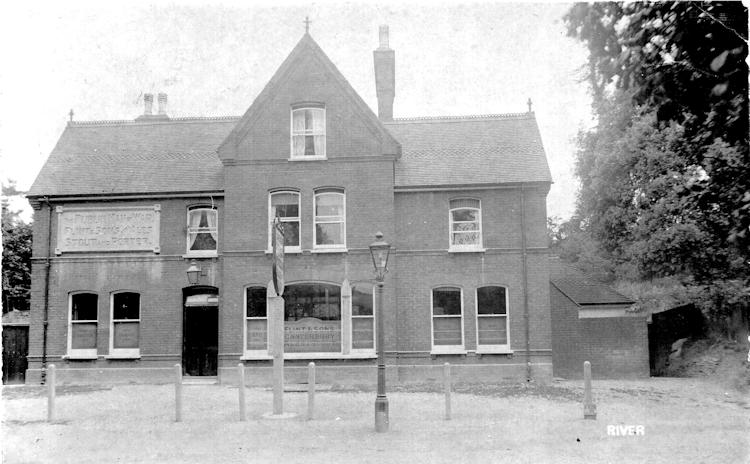
Above postcard, 1909, kindly sent by Graham Butterworth. |
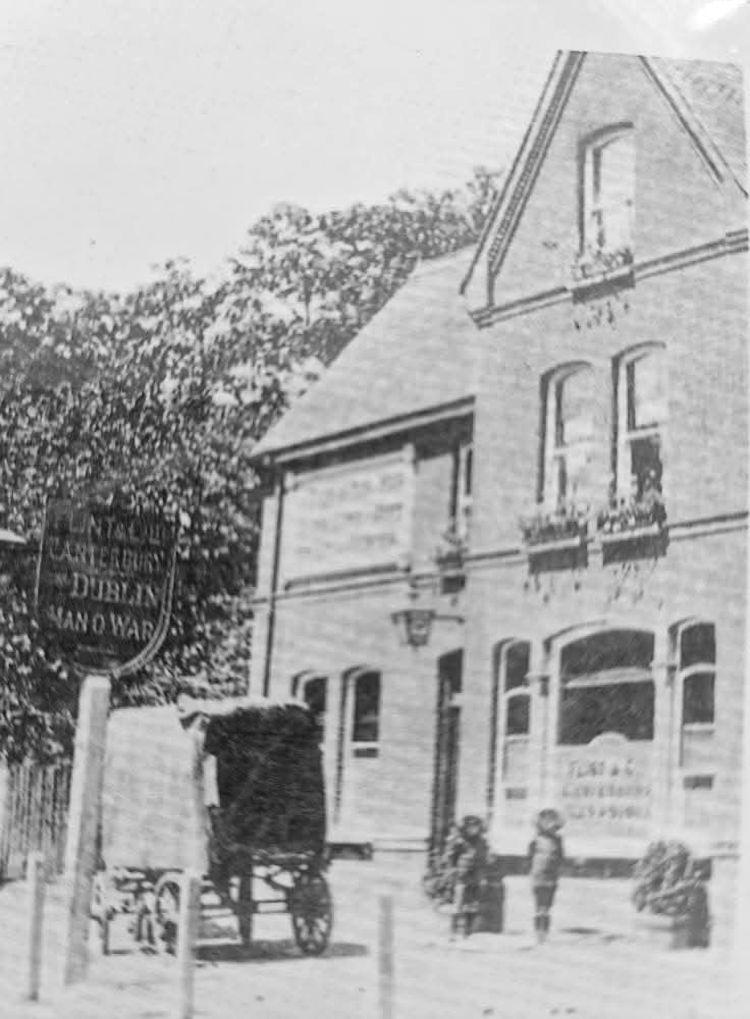
Above photo, date unknown. |
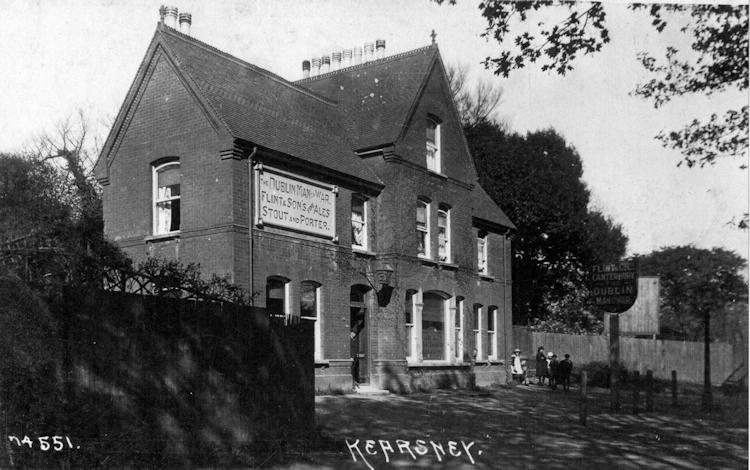
Above postcard, date unknown, kindly sent by Graham Butterworth. |
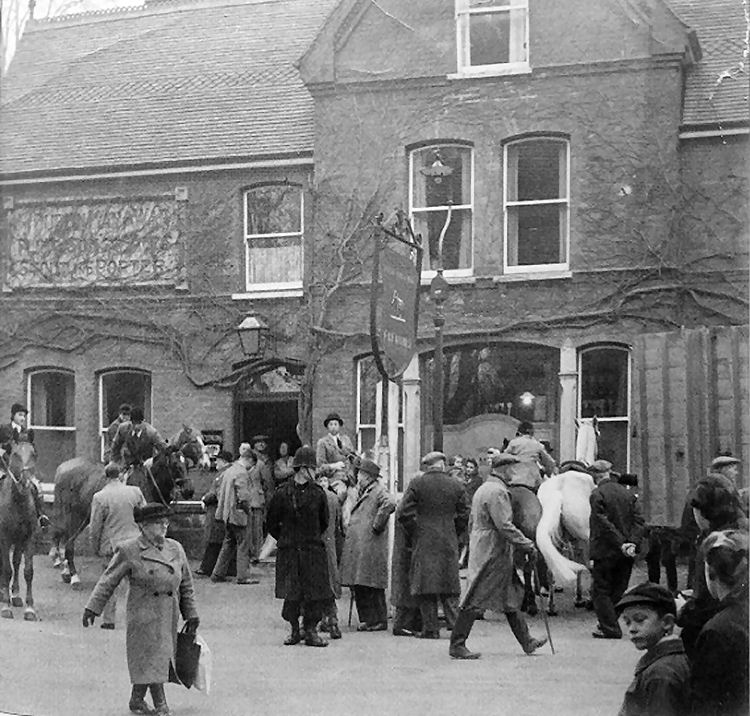
Above photo, 1952 showing the hunt, kindly sent by Rory Kehoe. |
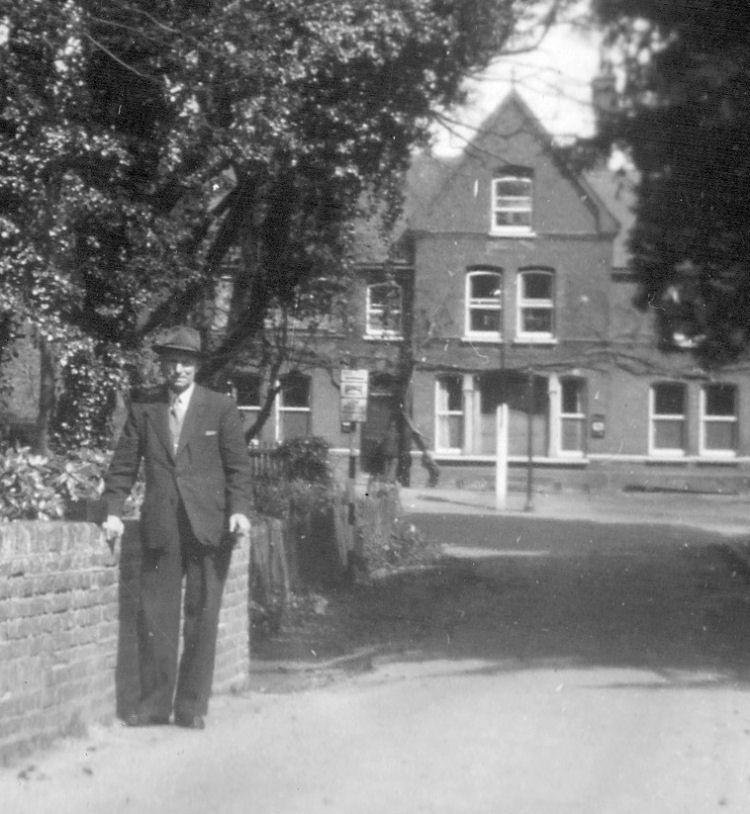
Above photo, 1950s, kindly sent by Paul Wells. |
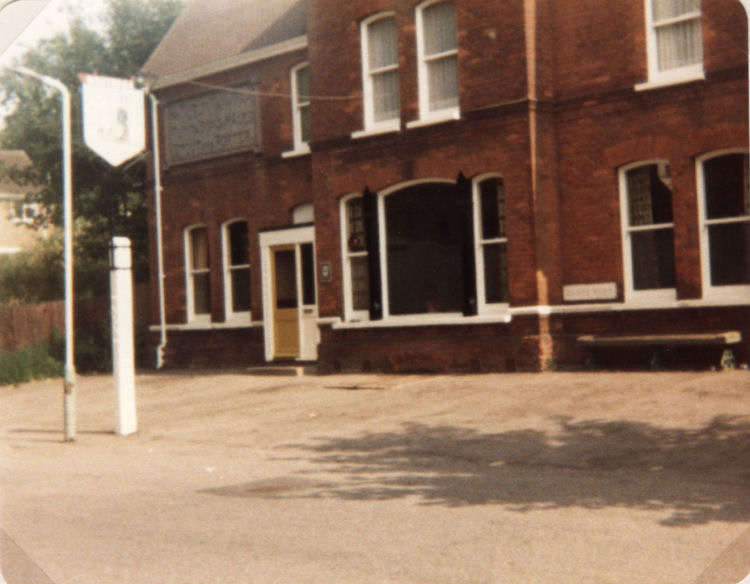
Photo above circa 1980 by Barry Smith. |
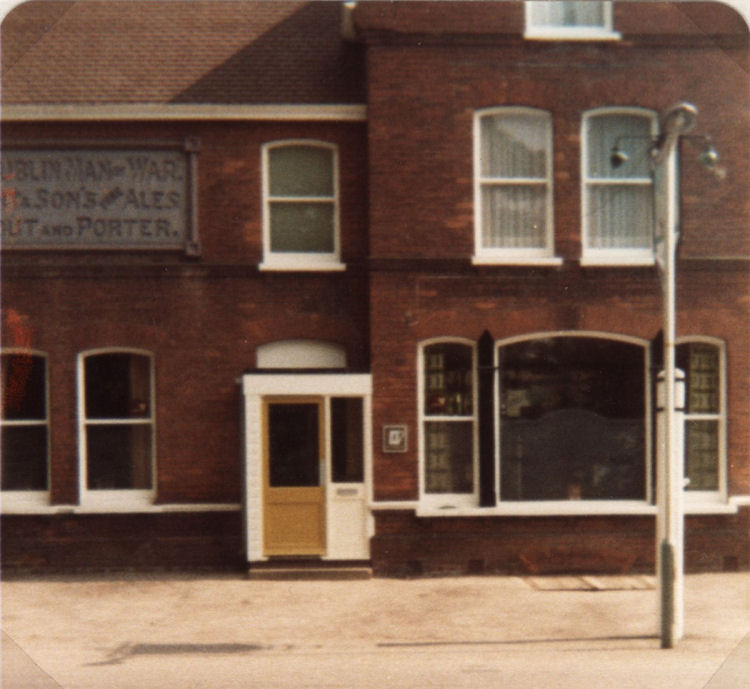
Photo above circa 1980 by Barry Smith. |

Above photo, 8 January 1983, by Jim Ashby. |
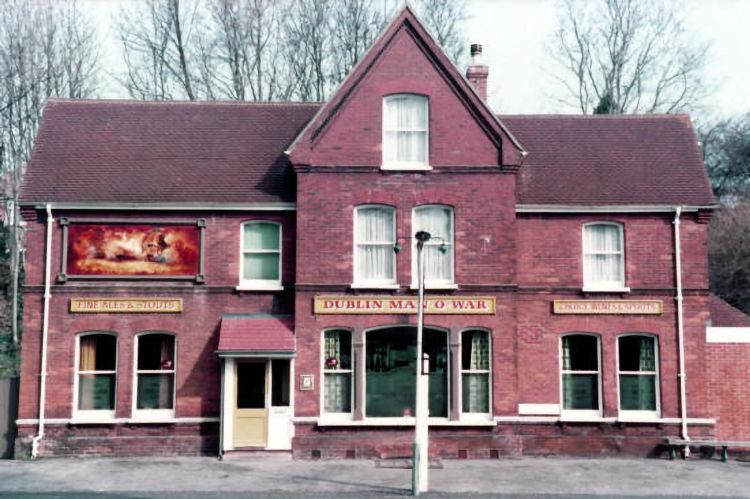
Above photo, 1983. Photo by Eddie Chard. |
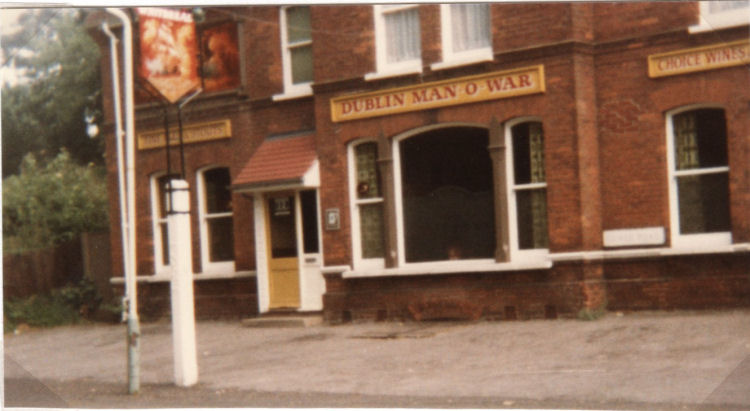
Above Dublin Man of War circa 1985 photo by Barry Smith. |
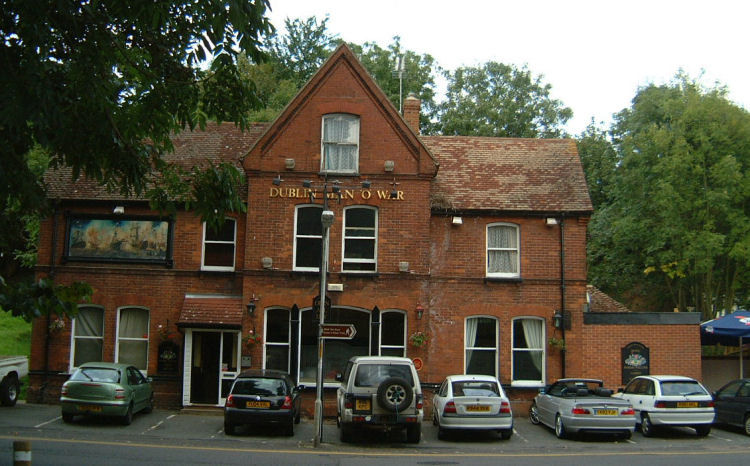 |
|
Photos above and below by Paul Skelton 8th Oct 2007 |

Above photo 2017. |
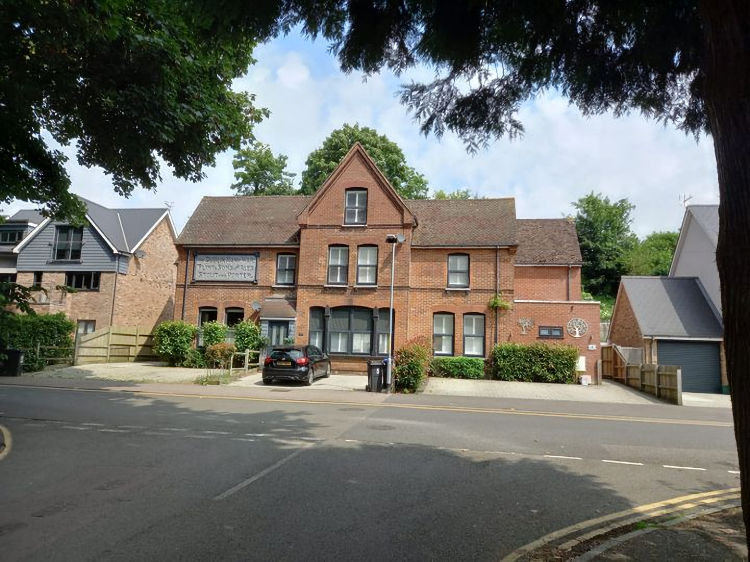
Above photo 2024. |
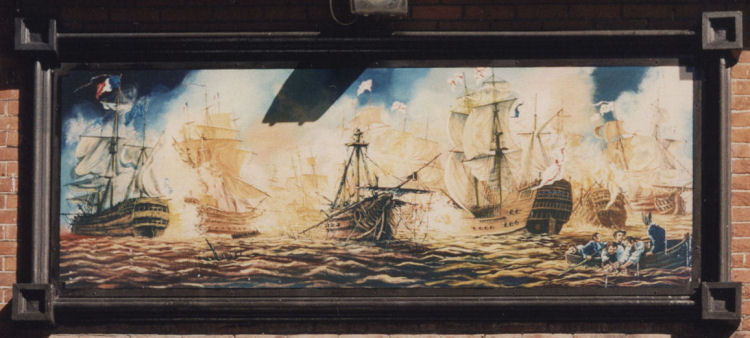 |
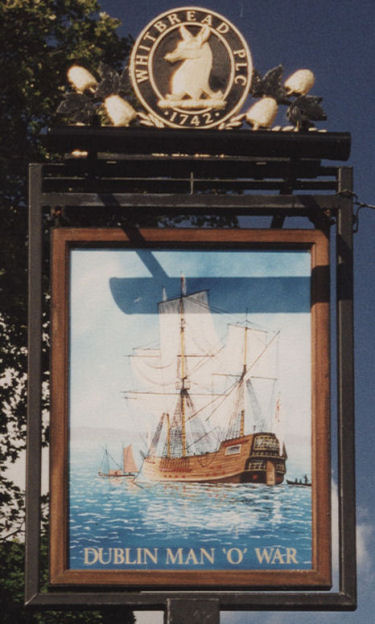 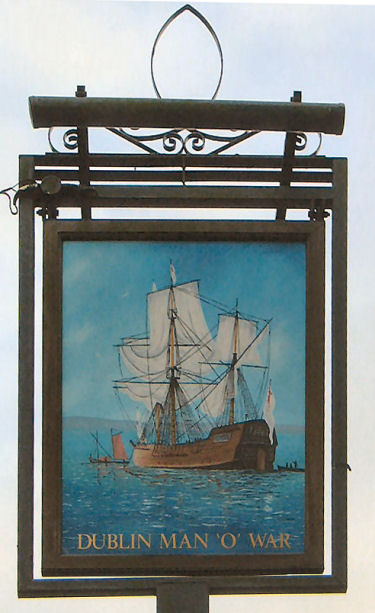 |
|
Sign right circa 1998, sign left 2007
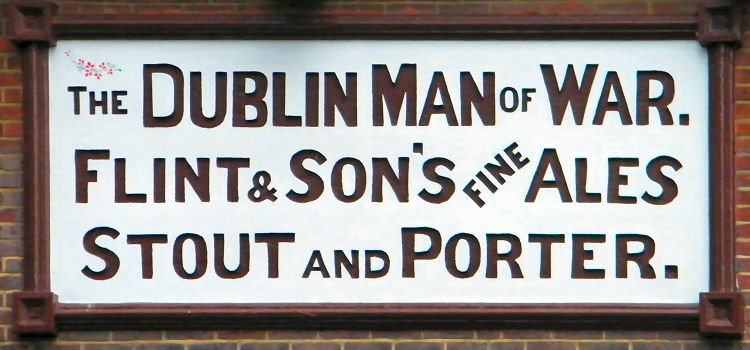
Above showing the original sign underneath the painting of the battle
scene, now showing as a permanent edition, March 2011. |
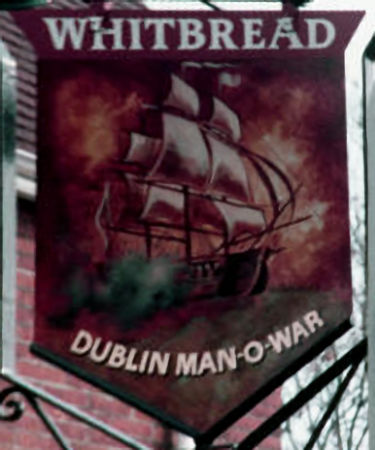
Above sign, 1983. Photo by Eddie Chard. |
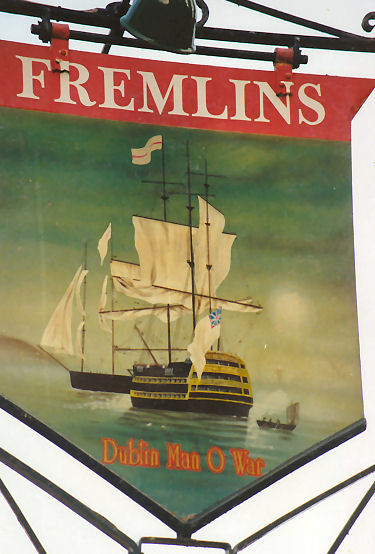 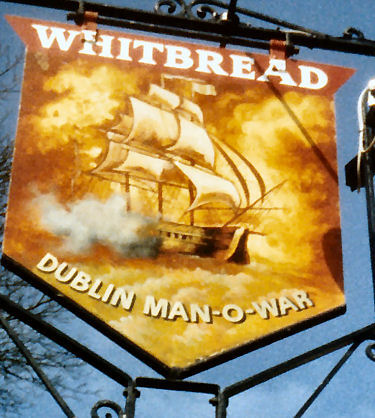
Dublin Man of War sign left, August 1981, right, April 1986.
Above with thanks from Brian Curtis
www.innsignsociety.com |
The first house with the sign stood not far from the present and it was
sold by Walker for £1,250 in 1859. John Knott served there in 1838. The pub
so far has been traced back to 1833, when a Mrs Brockman was licensee there,
or at least died in that year.
|
Kentish Gazette 01 February 1811.
TURNPIKE ROAD.
From Dovor through Waldershire to Sandwich.
The next Meeting of the Trustees will be hoIden (by adjournment) on
Monday next, the fourth day of this inst; February, at the "Dublin Man
of War," River, at twelve o'clock at noon. W. Knocker, Clerk.
|
|
From the Dover Telegraph, 7 December, 1833.
Mrs BROCKMAN died 5 Dec at
River – landlady of the "Dublin Man of War."
|
|
Canterbury Weekly, 26 August, 1837.
Death.
Aug. 19, at River, aged 72, Mr. Brockman, many years landlord of
the "Dublin Man-o-War," public house, at that place.
|
|
From the Dover Telegraph, 26 August, 1837.
Mr BROCKMAN, aged 72, died 19 August at River; many years landlord of
"Dublin Man of War" public house.
|
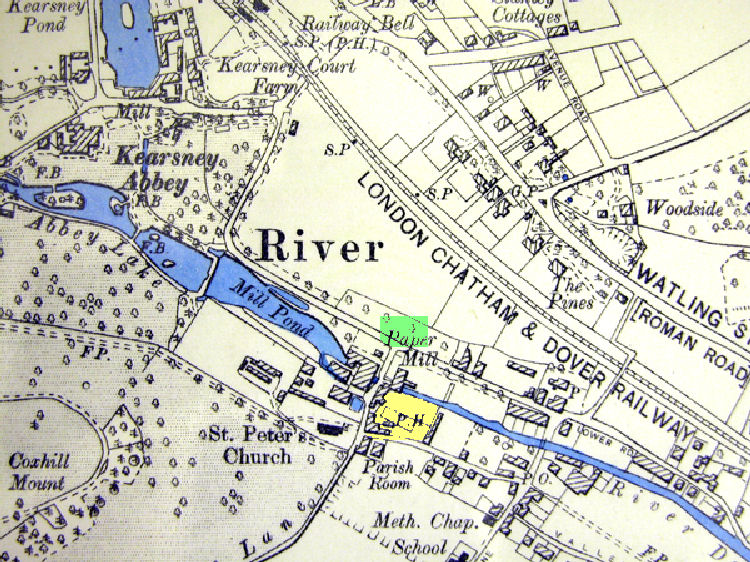
Above map shows River in 1881. The yellow patch shows the original
"Dublin-Man-O-War" public house. The green shows where it is situated
today. |
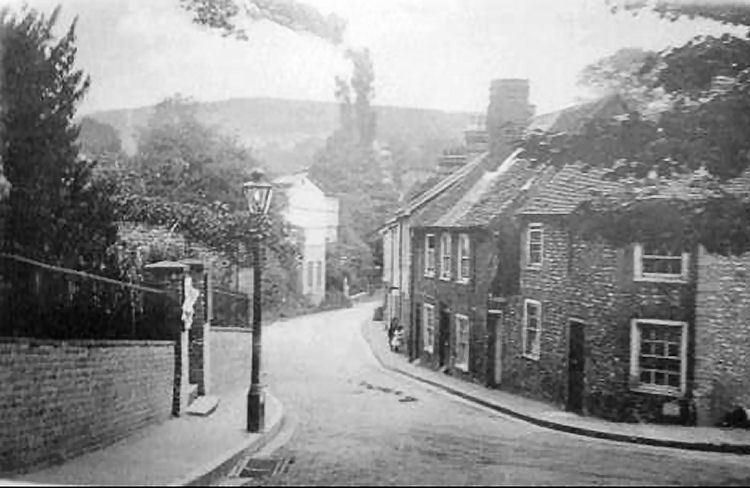
Above photo, showing Minnis Lane in 1913. The original "Dublin Man of
War" would have been to the right of the picture. |
|
Kentish Gazette 18 November 1808.
UNDERWOOD. TO BE SOLD BY AUCTION.
At the "Dublin" Public House, in River, near Dover, on Monday next, the
21st day of November, 1808, at three o'clock in the afternoon.
About Six Acres and upwards of Underwood, called Rowe's Wood; and about
Five Acres and upwards of Ditto, called Mean Hill; situated in the
parish of Alkham.
For further particulars apply to Mr. Daniel Sutton, carpenter, at Dover.
|
|
From the Kent Herald, 12 December 1833
Death
Dec. 5, at River, Mrs. Brockman, landlady of the "Dublin Man of War."
|
|
From the Dover Telegraph and Cinque Ports General
Advertiser, Saturday 6 July, 1839.
CORONER'S REPORT
An inquest was held at Knott's "Dublin Man of War," River, before T.
T. De Lassaux, Esq. coroner for the county, on the body of Henry Jarvest,
bricklayer, aged 53 years, whose death was caused by being knocked down
and run over by the horses of the London Mail, on Tuesday morning. H. P.
Mackenzie, in his evidence, stated that on the morning in question he
saw the deceased standing in the road, opposite the Town-hall, and heard
someone call out apparently to caution persons to get out of the road. A
few moments afterwards he saw the deceased lying in the centre of the
road, with the near hind wheel over the body. The mail was travelling at
the usual rate, and the horses were all trotting, and the coachman
pulled up as quickly as possible. The body was removed to the "Salutation,"
and medical assistance sent for. The deceased, who had worked for
witness three years, was very deaf; so much so that he could only hear
with a trumpet, and even then with great difficulty. Mr. Rutley,
surgeon, attended the deceased shortly after the accident, and
discovered a lacerated wound on the left side of the head and face. He
caused the deceased to be removed to his residence, at River, where he
subsequently attended him; and on further examination, he considered
his death was caused from internal injuries.
Verdict, "Accidental death, with a deodand of 1s. on the horses." The
jury concurred that no blame was attached to the coachman.
|
|
From the Dover Express and East Kent Intelligencer, 4
June, 1859.
COUNTY POLICE COURT
John Huggett and Mary Huggett, the man and woman who had been taken
before the Borough Magistrates the same morning and remanded to this
office, were brought up by police-constable William Terry, charged - the
man from stealing from the person of George Hawkins, a brickmaker, a
portemonnaie (A small pocketbook or wallet for
carrying money) containing 4s. 6d. in money, together with a
pocket-book, and the woman with receiving the same, knowing them to be
stolen.
George Hawkins said he was a labourer living near the "Halfway House"
to Canterbury, and was drinking at Mr. Knott's public house, at River,
on Saturday, in company with the male prisoner, who was a
fellow-workman, and some other men. When he went into the house his portemonnaie contained 9s. That was about 4 o'clock in the afternoon. He
remained drinking and treating other men till about 9, and in that time
spent 4s. 6d., leaving 4s. 6d. still in his purse. He had become
intoxicated, but knew perfectly well what he was doing. About the hour
mentioned he went into a stable at the rear of Mr. Knott's house to lie
down, being assisted there by the landlord and the male prisoner. He lay
down, and Huggett and the landlord went away, but in a short time
Huggett returned and felt in his (prosecutor's) pockets. He took from
the right hand pocket of his (prosecutor's) trousers his portemonnaie,
containing the sum above stated, and from the inner breast pocket of his
coat a leathern pocket book, in which were some letters and the
certificate of a child's death. The letters were addressed to his
father-in-law, Joseph Deal, and were from his brother-in-law, whose name
was also Joseph Deal. One was from Portsmouth. The name of his
father-in-law and his own name wee in the book. He asked prisoner what
he was about, when he replied that he (prisoner) was his friend, that he
had been drinking with him, and would take care of his money for him.
In reply to the Magistrates, prosecutor said he was too drunk to get
up and prevent Huggett taking his property away, although he was
perfectly conscious of what passed. On going to Huggett's house on the
following morning and requesting him to give up the pocket-book and
purse Huggett denied that he had taken them, and he therefore went and
gave information to the police.
Mrs. Charlotte Baker, wife of John Baker, "a manufacturer of safety
lights," carrying on business in Essex Street, Mile-end, London, said he
lodged at Buckland at the house in which the prisoner also occupied
apartments. On Saturday night she heard them quarrelling about a letter,
and from what passed it appeared that the woman had got a letter from
her husband which he wanted returned to him. Shortly afterwards the
female prisoner came to her and asked her what she had overheard, and
whether she would read to her a letter she had with her, as she herself
could neither read or write. She had in her had a pocket-book with a
dark-brown leather cover. She opened it and took from it a letter which
she handed to witness to read. The letter had been written at
Portsmouth, and appeared to be from a son to his mother; but witness did
not recollect the signature. The pocket-book also contained a
certificate of the death of Thoman Joseph Deal. Witness observed to her,
"Your husband's name is not Deal," to which Huggett replied "No," and
then returned the letter and certificate to the pocket-book and went
away.
William Terry, a constable of the borough police force, said that in
consequence of information furnished by the prosecutor he apprehended
the male prisoner Huggett at his lodgings on the previous morning upon a
charge of stealing a purse and money and a pocket-book, belonging to the
prosecutor. He denied any knowledge of either, and also persisted in
that denial upon the charge being read over to him by the superintendent
of police after he was lodged at the station-house. The prisoner
accompanied witness to the lodging of the prisoners. Witness searched
the male prisoner after he was in custody, but nothing to connect him
with the robbery was found on him. That (Monday) morning, while in
custody at the borough magistrates' court prisoner asked to see the
prosecutor. On witness telling him that was impossible, he said, "I did
take the pocket-book, and I burnt it when I heard the police were after
me, but I know nothing about the purse." hearing that the prisoner had
been seen with the pocket-book, witness returned to the prisoner's
lodgings and took her into custody, when she denied that she had had it,
but subsequently acknowledged that she had taken the pocket-book from
her husband's pocket, and that after getting the contents read to her
she had returned it.
By the male prisoner - When admitting that you had had the
pocket-book you told me that you picked it up in the room in the
public-house.
The prisoner also cross-examined the prosecutor, to show that before
he retired to the stable he lay upon a form in the public-house and
rolled off to the floor.
Superintendent Coram said that from what had been ascertained he did
not think the woman was feloniously implicated, but had taken the
pocket-book from her husband in a fit of jealously, and under the
impression that the letters it contained had been received by him from
another woman.
The Magistrates, believing this to be fact, discharged the female
prisoner.
Huggett, on being called upon for his defence, denied any knowledge
of the purse. He admitted that he had the pocket-book, but said that he
had picked it up from the floor of the tap room.
The Bench committed him for trial at the next East Kent Quarter
Sessions.
|
|
From the Dover Express and East Kent Intelligencer, 4
June, 1859.
COUNTY POLICE COURT
John Huggett, a brick-maker, was charged with stealing a portemonnaie
containing 4s. 6d., and a pocket-book, the property of George Hawkings,
at River, on the preceding Saturday; and Mary Hugget, his wife was
charged with feloniously receiving the stolen articles. It appeared that
the prosecutor and the male prisoner were fellow-work-men and had been
drinking together at the "Dublin Man of War," at River, on the preceding
Saturday, and that the prosecutor, becoming intoxicated, went into a
stable at the rear of the house to lie down. When he went into the
stable he had his purse, containing the sum stated, safe in his
possession. After laying there some time he was aroused by some one,
and, looking up, saw Huggett, who had got his purse, and who told him
that he was "his friend" and would take care of it for him. Although
sober enough to remember this, the prosecutor was too drunk to prevent
Huggett walking off with his property; but as soon as he had
sufficiently recovered he came to the police-station at Dover and gave
information of what had transpired, and on Sunday morning the prisoners
were apprehended at their lodgings at Buckland. The property taken from
the prosecutor had not been found, but it was ascertained that the
female prisoner had been dealing with a pocket-book believed to be the
prosecutor's.
The Magistrates thought the case did not come within their
jurisdiction, and the prisoners were therefore remanded to the County
Magistrates' office. Their examination will be found elsewhere reported.
|
|
From the Dover Telegraph and Cinque Ports General Advertiser, Saturday 13 August, 1859.
DUBLIN MAN OF WAR INN, RIVER.
A select pic-nic will take place on Monday, August 15th, 1859, when the
attendance of yourself and friends are particularly requested.
Tickets, 1s 6d. each, to be obtained of Mr. Penn, baker, High Street;
Mr. Dowle, Bench Street; Mr. J. Nazer, Cannon Street; Mr. Prescott,
Oxenden Street; Mr. H. Burton, High Street; Mr. Yonwin, "Star Inn,"
Church Street; Mr. Knott, jun., "Dublin Man of War Inn," River.
Leaver's Quadrille Band is engaged.
Tea at half-past Four o'clock.
Admission after Tea Sixpence each.
|
|
From the Dover Express and East Kent Intelligencer, 3
September, 1859.
ABSURD CHARGE
George Jones and Charles White, brick-makers were charged with
feloniously possessing themselves of £5 8s. 9d., the property of their
employers, Messrs. Nightingale and Bushell.
The grounds upon which the prisoners had been given into custody were
a little singular. It appeared that they had been employed in a "gang"
composed of themselves and two other men, and that the "ganger," a man
named George Welsh, had been authorised to pay their wages, which in the
whole amounted to the sum alleged to have been stolen, on the previous
Saturday. On the men being set on, Welsh had, in accordance with the
practice of gangers, become answerable to the landlord of the "Dublin
Man of War" (Mr. Knott), where the prisoners had been lodging, for their
board and lodging, and he had intended to stop the amount due to the
landlord out of their wages. Before he could do so, however, one of the
men got possession of the money an shared it with his fellow workmen,
for which act he had been given in custody of the police on a charge of
felony. The following is the evidence:-
George Welch - I am a foreman in the employ of Messrs. Nightingale
and Bushell. The prisoners, George Jones and Charles White are also in
their employ and have been at work with two other men during the last
week at River. All the four men came to the pay-table at the "Dublin Man
of War," River, on Saturday afternoon, and I had their wages, amounting
altogether to £5 8s. 9d., to pay them; but out of this sum £3 0s. 11d.
had to be deducted for the board and lodging of the four men, and for
which I had become responsible to the landlord, Mr. Knott. Before
handing the men their money, I put the whole amount down on the
pay-table. The four men were in the room, but I had no time to say who
it was for. I said, before putting it down, "I have got the money," and
as soon as I put it down the prisoner Jones took it up and went off. I
followed him and asked him what he was going about, when he replied
that he was going to buy some extra eggs. (A laugh.) I told him he had
better give me the money he had taken; but I said nothing to him about
stoppages. I wanted back the whole on the money. I kept him "in tow"
until the policeman came, when I gave him in charge for taking the
money. During the time Jones had the money he shared it among the four.
By the Mayor - Do you know what arrangement was made between the
master and the men as to wages, or whether it was understood in their
agreement that part of their wages was to be stopped?
I was responsible to the landlord for the board and lodging of the
men, and I became so with their consent.
There was no further evidence with respect to the taking of the
money.
The Magistrates thought the only point was whether the prisoners had
or had not authorised any stoppage of their wages for paying the bill of
the landlord, which was scarcely a question for the Magistrates.
Another of Messrs. Nightingale and Bushell's gangers, who was
present, said that it was his practice, when employing men like the
prisoners, to become answerable for their board and lodging to the
landlord of the house at which they might be staying, and before paying
them their wages to stop the amount.
Mr. Finnis said he should like to know how Jones and White got into
custody. At present they appeared charged with an offence unsupported by
a particle of evidence.
Lewis Whorwell, the constable who took the prisoners into custody,
was then called.
He said - I received the prisoners into custody from the last witness
about half-past five on Saturday last. He gave them in charge for
stealing £5 8s. 9d. I enquired into the circumstances, and Welch replied
that the money had been stolen from his pay-table at the "Dublin Man of
War." He said he was bound to see each man paid his regular wages,
otherwise he should be the loser himself. I asked him if he persisted in
preferring the charge, and he said he did. I then took prisoners into
custody. Welch said nothing about stoppages. On searching Jones I found
on him £1 4s. 0d., and on the other prisoner £1 2s. 6d. I did not find
£5 8s. 9d. altogether, but Welch said the prisoners had given some of
the money to some other men.
The Bench dismissed the case, observing that if the prisoners were
indebted to the landlord of the "Dublin Man of War" the landlord could
find his remedy in another court.
|
|
From the Dover Express and East Kent Intelligencer, 14 May, 1880. Price 1d.
AN ACCIDENT AT CRABBLE
An inquest was held at one o'clock on Monday afternoon at the “Dublin
Man of War” public-house, River, before T. T. Delasaux, Esq. the Coroner
for East Kent, on the body of William East, then living at Crabble
House.
The following were the Jury:- Messrs. R. F. Jennings (foreman), J. W.
Bacon, G. H. Igglesden, G. Brothright, E. Hills, A. Hewett, J. Hollis,
W. Graves, J. J. Robinson, Jun. W. Wood, T. W. Fry, R. Tritton, and C.
Goodchild.
Mr. Worsfold Mowll was present to represent the deceased's family, and
also Police-sergeant Barton on behalf of the Dover Police, the
deceased's residence being at Dover.
The following evidence was taken:-
Reynolds Mowlle, of 36, High Street, Charlton, Dover, said: The deceased
also lived at Charlton, and his age was about 74. On Tuesday, May 4th, I
accompanied the deceased, his son, and house-keeper in a four-wheeled
pony carriage, for a drive, starting from my own house about a
quarter-past two in the afternoon. The deceased was driving, and, as
usual, very steady. We intended going as far as the “Halfway House” on
the Canterbury Road. We proceeded up Crabble Hill, and turned down to
the left into Crabble. When hear the railway arch two brick carts were
seen approaching. The horse suddenly shied and bolted, and then I know
the carriage went on its side, and we were all thrown out of the trap on
to a heap of stones. The deceased must have reached the ground first,
for I fell upon him. When I became conscious there was blood on the
deceased's forehead, and he was still insensible. I was removed into the
house of Mr. Langley, and also the deceased, Miss Stevens, a lodger,
kindly giving up her rooms to us. The deceased remained there until his
death, which was on Saturday evening about seven o'clock, when I was
with him. I believe it purely an accident. There were two seats, the
deceased and myself being on the front, and the other two behind.
By the Jury: We stopped at the top of the hill, but I can't say if it
was to put on the break.
Charles Langley, of Crabble House, in the parish of River, lodging-house
keeper, said: About half-past two on Tuesday, May 4th, whilst indoors I
saw a horse and carriage go by at a furious rate without any driver or
anyone in it. It went round by the Paper Mills and I saw one wheel was
missing. I went out and saw the deceased and last witness on top of a
heap of stones, and two others lying at the side. The last witness, who
had fallen on the deceased, was after I got assistance removed to my
house, and Miss Stevens, a lodger, kindly gave her room up for them. The
deceased was then taken into the house, and some men from the mill
looked after the others who were sensible and did not receive great
injury. The deceased's head was resting on his left shoulder and he
complained and said, “Oh my neck; put my head up.” A tooth fell out of
his mouth on to his coat when he was moved. On examination of the spot I
found the impression of a wheel or wheels had passed over a heap of
stones at the said of the road, which I should think was the cause of
the accident. There were only three spokes in the wheel that came off. I
sent for medical assistance and the deceased stayed at my house until
his death.
Mr. Osbourne, of 2, St. Martin's Terrace, Dover, said: On Tuesday, May
4th, at about five o'clock, he was sent for by Mr. E. P. Robinson to
attend deceased at the residence of the last witness. I attended at once
and found deceased conscious, and he said he had had a carriage
accident. I examined him and found the deceased had no feeling below the
middle of his chest and was quite paralysed. I continued to attend him
until his death on Saturday evening from concussion of the spine, which
might have happened through a carriage accident like the one described.
The Jury, after a short consideration, returned a verdict of “Accidental
Death.”
Mr. Worsfold Mowll said on behalf of the deceased's family he had to
tender their best thanks to Mr. Langley and the ladies at his house, and
also to Mrs. Wood for their kind assistance at the time.
|
|
From the Dover Express and East Kent Intelligencer, 13 April, 1883. Price 1d.
On Sunday morning the body of John Knott, formerly landlord of the
“Dublin Man-of-War” at River, but who has lately been residing in Dover,
was picked up in the Granville Dock. The manner of his coming there is
unknown.
|
|
From the Dover Express and East Kent Intelligencer, 13 April, 1883. Price 1d.
FOUND DROWNED
An inquest was held on Tuesday afternoon last, at the “George Inn,”
Commercial Quay, before the Coroner (S. Payn, Esq.), on the body of John
Knott, late landlord of the “Dublin Man-of-War” public-house, River.
The following gentleman were on the Jury:- John Erby (foreman), Messrs.
Pendley, H. Farley, W. Wilden, G. M. Houlden, T. Lane, James Emery, W.
D. Dance, James Hopper, G. T. Wilkins, J. White, J. Harris, M. Kounely,
H. Blair, and J. Hors.
Samuel John Knott, a carpenter living at 14 Magdela Road, Buckland,
said: The body of the deceased lying at the Dead House is that of my
father, and his name is John Knott, a publican, but at present out of
employment. He kept, for a long time the “Dublin man-of-War” at River.
He has been for some time living at Mr. Ayres, blacksmith, Priory Road.
On Saturday night at twenty minutes to eight I last saw him alive and he
was then at home. I left the house leaving him at home. For the last
twelve months the deceased has suffered from rheumatic gout. He has done
nothing to lead us to suppose that he would destroy himself. He
continually went for walks on to the Pier and in that district. He was
52 years of age.
Frank Ayres, son of Richard Ayres a blacksmith, living at the forge
house, Priory Road, said: The deceased Mr. Knott lodged with my father.
At about half-past nine o'clock on Saturday evening he left home and I
wished him “good night,” but he made no answer and went out.
By the foreman: Witness said that the deceased had lodged with his
father for six months. I have never seen him taking any medicine.
Jesse Keeler, a mariner, living at No. 11 St. John's Place said: On
Sunday morning I was walking along the Quay at a quarter to six, when I
saw the body of the deceased in the water opposite the Custom house. I
obtained a boat and found that the body was standing nearly upright, and
he had his hat and all his clothes on. With assistance I lifted him into
the boat and took him to the Dead House. The limbs of the deceased were
limp as if they had not been in the water long. The inside of the hat
was not wet.
Mr. C. C. Walter surgeon to the Borough Police said: On Sunday morning
at about eight o'clock I was called to go to the Dead House to see the
deceased. I went and examined the body externally. There were no marks
of violence – death was caused I believe by drowning. About six months
ago I attended the deceased for congestion of the lungs, and he also
suffered from rheumatic fever. He was then very depressed and wanted to
know whether he was going to die. He told me that he was losing money,
and was rather in difficulties.
The Jury returned an open verdict of “Found Drowned.”
|
|
Canterbury Journal, Kentish Times and Farmers' Gazette 27 August 1887.
ALLEGED ADULTERATION SPIRITS.
James Rolls, landlord of the "Dublin Man of War," River, was summoned on
the information of Superintendent Maxted, for selling whisky adulterated
with water.
After hearing the evidence of P.C. Holness, who purchased
the spirits, the magistrates dismissed the case.
|
|
Dover Express 22 April 1898.
THE DUBLIN MAN OF WAR.
Mr. Rutley MowIl applied for an order to make final a provisional
permission for the removal of the license of the "Dublin Man of War," at
River, to new premises which had been erected on the other side of the
road, to where it had formerly stood. The tenant, who would remain in
chart, had already been in the house for the last twelve years.
Mr. Mowll called the architect, Mr. Edwin Pover, who said that the house
had been completed in accordance with the plans, as laid before the
bench.
The application was granted subject to the production of the License.
|
From the above article dated April 1898 I suggest the original house
closed around this month.
The present house was reported as fairly new in 1907 and I was very
impressed by the advertisement I saw dated 1914. It stated that the house
had tea gardens set amongst the walnut and cherry trees and it invited
people to get the children off the road so they would not get knocked down
by the traffic. The public were also invited to indulge in the more potent
liquors, which it claimed were the natural beverages of the open air loving
Englishman.
However, the original house used to have its own bowling green.
|
Dover Express 21st September 1900.
TROUBLE AT THE DUBLIN MAN OF WAR.
Arthur Brookman was charged with being disorderly on August 28th at the
"Dublin Man of War," River.
Horace George Rolles, son of the landlord of the "Dublin Man of War," gave
evidence in support of the charge.
Prisoner said that the reason he created a disturbance was that he could
not get his change for a sovereign.
Rolles said this was quite untrue.
PC McKie gave evidence that the defendant was the worse for liquor and
that he ejected him from the "Dublin of War."
The Bench imposed a penalty of £1 inclusive or 14 days. The money was
paid.
|
|
From The Dover Express, Friday, August 21,1903; pg. 7; Issue 2355.
RIVER.
On Tuesday afternoon, the funeral took place of Horace George Rolle, the
youngest son of Mrs. Rolle, of the "Dublin Man O' War", River, who died on
the previous Friday. The greatest sympathy is felt for Mrs. Rolle in her
bereavement, as it will be remembered that she has lost her husband,
three daughters, and two sons, and one son-in-law in a very short
period. The wreaths were sent by Miss Adcock, Mr. Terson, Miss Jeffries,
the Kearsney Social Club, Mrs. Curtis, and others.
|
|
Dover Express 15 September 1905.
RIVER. A SERIOUS ACCIDENT.
On Tuesday evening about eight o'clock, Mrs. Rolles, the well known and
respected landlady of the "Dublin Man of War," River, broke her right
leg just below the knee owing to falling from a chair, on which she was
standing in her bedroom, whilst reaching up to a cupboard. Dr. Rubel and
Dr. Robins have been in attendance, and, naturally, owing to the lady's
advanced age, her condition is regarded with some anxiety.
|
|
Dover Express 07 May 1915.
CORRESPONDENCE.
(To the Editor of the Dover Express.)
Sir, - May I beg a little space in your valuable paper? Last (Wednesday)
evening, from 8.40 until 10.40 p.m., we were subjected to a drunken
brawl and fight between nine soldiers, who occupied the whole of the
road outside the "Dublin Man-of-War." Surely such a thing would not be
allowed in the town, and yet we are heavy ratepayers and receive no
advantages as in the town. These soldiers were allowed to carry on, and
there were no police or pickets to stop it. Would it not be much better,
to save scenes as was witnessed last night, to let the picket patrol
these dark roads as well as the lighted main street?
A. RATEPAYER.
|
|
Dover Express 13 May 1921.
The funeral of Mrs. Worster, wife of Mr. A. Worster, of the "Dublin
Man-o'-War," took place on Monday at River Churchyard, the Rev. D. A. Townend officiating. Mrs. Worster died on Thursday last week, after a
long illness. The mourners present were Mr. A. Worster (husband),
Messrs. L. M., L., and E. Worster (sons), Mr. and Mrs. Houghton
(brother-in-law and sister), and Mr. and Mrs. Bayley (brother-in-law and
sister). Wreaths were sent from Alec (husband), Leslie, Evarards and
Edward (sons); Mr. and Mrs. Houghton; Mr. and Mrs. Bayley; Mr. Burvine;
Mr. Twyman; Mr. Jackson; Mr. and Mrs. E Brockman; Mr. and Mrs. Duggan;
Mr. and Mrs. Brisley; Mr. and Mrs. Russell and Ray; Mr. Arnold; Mr. J.
Fox; Mr. and Mrs. Todd ; Aunty; Connie and George, also Mr. and Mrs.
Varden; River Peace Committee: and two wreaths from the "Dublin
Man-o'-War " Slate Club. The funeral arrangements were carried out by
Mr. Morgan, of Maxston.
|
|
Dover Express 24 November 1922.
SUDDEN DEATH OF MR. A. WORSTER.
The sudden death of Mr. Alexander Worster, of the "Dublin Man-o'-War,"
River, on Tuesday was the subject of an inquest held there by the
Borough Coroner, Mr. Sydenham Payn, on Thursday afternoon.
Leslie Moncriffe Worster, a son, identified the deceased as his father,
Alexander Worster, who was a commission agent, aged 58 years. The
licence of the "Dublin Man-o'-War" was in his name, but it was being
transferred to witness. When his father went out on Tuesday morning,
about 9 a.m., to go to his business he appeared in his usual health, and
made no complaint. Witness did not see him again until he returned about
5 p.m., when he still seemed in his usual health. He had been riding his
motor cycle, and said he had been to St. Margaret's. He warmed his hands
in front of the fire. He said that he had had trouble with his cycle on
Crabble Hill, and had had to push it all the way up. He did not seem
disturbed at all; in fact, he came in singing and sat down in the
armchair. He sat there about five minutes, and asked witness to look
over his cycle in the morning. Then he suddenly went back in the chair
and made a gulping noise, and appeared to die. Witness sent his brother
for the doctor, and Dr. Howden arrived. As far as witness knew, his
father had had no extra worry or excitement recently. He could not
remember him having had a doctor, but he had rheumatic fever five times
before he was married.
Alice Glasse, a widow, and a sister of the deceased, said that she had
been in charge of the house since April, 1921, when his wife died. She
had not known him to have a day's illness. She saw him on Tuesday, when
he came home at 5 p.m., when he seemed wonderfully well. He was warming
his hands, which he said were cold, and then, leaning back in the chair,
and, without a struggle, he expired. She knew the deceased had had
rheumatic attacks before he was married. He suffered with his feet
through rheumatism.
Dr. I. Howden said that on Tuesday, at 5.10, on arrival home, found that
he had been telephoned for. He went at once to the "Dublin Man-o'-War,"
and on arrival found Mr. Worster supported in a chair by his sister near
the sitting room fire. The deceased had been dead, perhaps, a quarter of
an hour. The two previous witnesses and two other people were present,
and he heard what they said. He had attended all the family except the
deceased at different times, but he had no doubt, from what he was told,
that he died from heart failure. His appearance was consistent with such
a view.
The Coroner: Pushing a bicycle up a hill did not do him any good?
No;
probably that was the cause.
A death from natural causes was returned.
|
|
Dover Express 7th September 1945.
Town, Port & Garrison.
On Thursday, Anthony Gallagher, Aged 15, of 59 Hillside Road, was
cycling in Lower Road near the “Dublin Man O’War” when he was thrown off
by a sunken inspection cover. He was taken to hospital with a fracture
of the left elbow and detained.
|
|
From an email received, 25 June 2012.
Can you help
me? I am trying to find out if there was a bowling green with the pub
when it was situated across the road.
The reason for my asking is that the other day at auction I came
across a pair of bowling balls marked 'Won by T. Pain Jun, 31/8/83 on
the Dublin Man of War Green, River'. I can only presume that the date
must be 1883 as the 'new' pub does not have a bowling green.
Regards,
Lee Abraham.
Lee kindly sent me the following pictures of
the bowls.
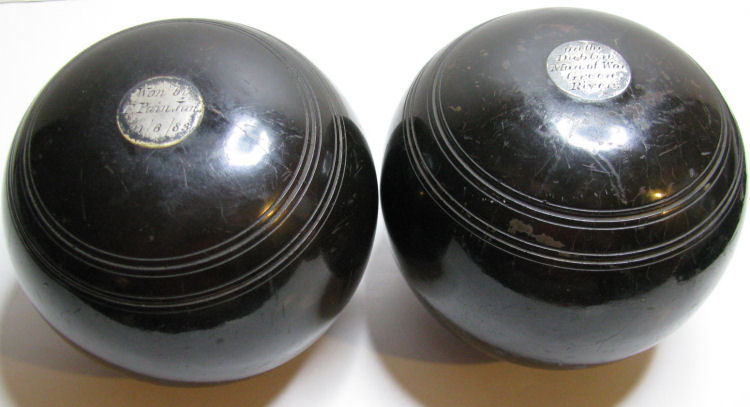
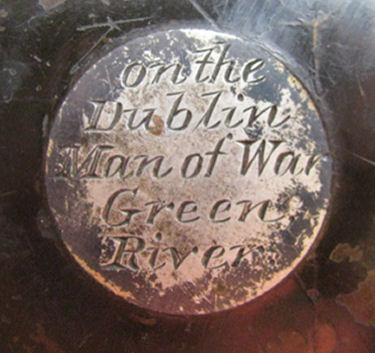 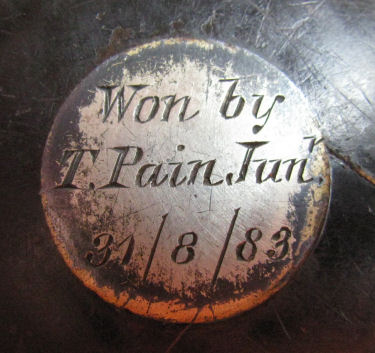
|
The tenants and managers can all be counted on the fingers so that says a
lot.
This old outlet of Flint passed to Fremlin and several bars were
converted to open plan by Alan Ellis in 1987.
|
From the Dover Express and East Kent News, Friday, 24
September, 1937.
NEW ESTATE AT RIVER
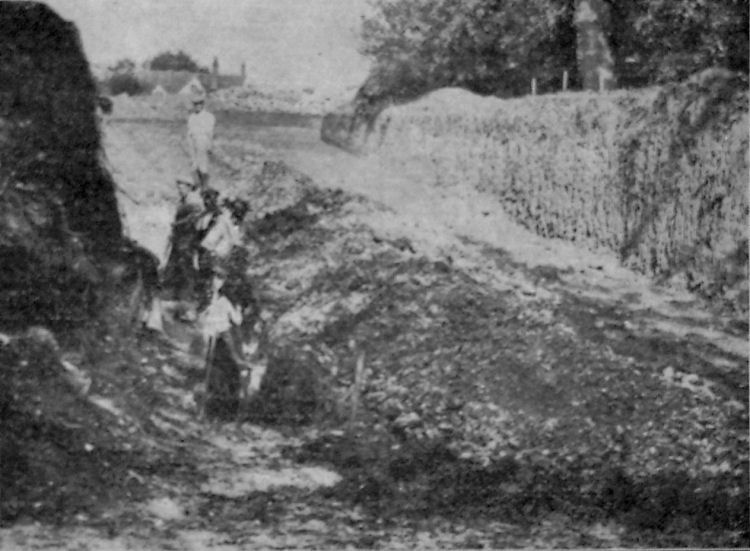
Good progress has been made on the new road at Pavilion Meadow,
leading off the Lower Road, River (in the forefront of the picture). It
has been cut from a point about 80 yards on the left on the Kearsney
side of the "Dublin Man-o-War." A row of houses is to be built on the
site behind the "Dublin Man-o-War." Mr. Douglass Pope, of Folkestone, is
the builder.
|
|
From the Dover Express and East Kent News, Friday, 11
February, 1938.
MINNIS LANE CLOSED
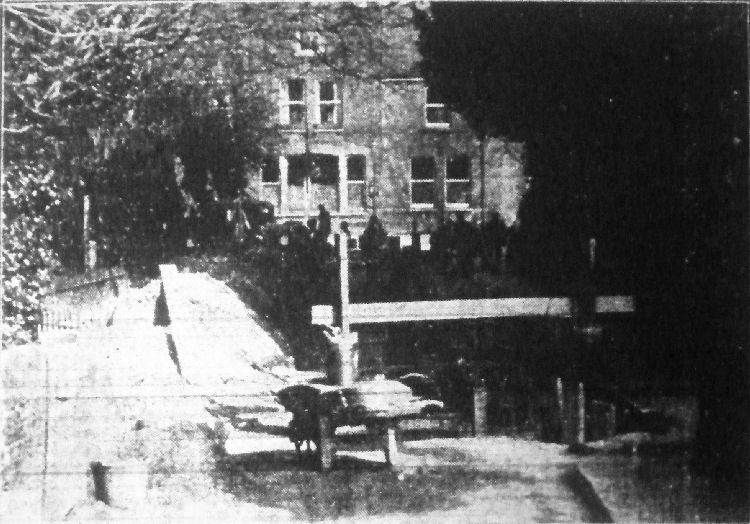
The laying of a surface water drain from the Chisnell Estate, Lower
Road, into the River Dour has necessitated the temporary closing of
Minnis Lane at this point. The "Dublin Man-of-War" can be seen at the
back of the picture.
|
|
From the Dover Express, Thursday, 25
October, 2012. 65p.
PUB'S EVENT TO RAISE CASH FOR HOSPICE.
Prizes for the best fancy dress and most petrifying pumpkin will be
handed out at a charity event at The "Dublin" pub on Lower Road at the
weekend to raise money for the Pilgrim's Hospice.
Organiser Jemma Perry said one of the pub's regular darts players is
suffering from cancer and the money raised on the day will go towards
helping her.
The Hallowe'en-themed event will run from 2-5pm on Sunday. Entry is
free.
|

Above photo showing the pubs Stock Car. June 2014. Photo by Raven-Cheyenne Caistor. |
Latest news is that the pub has now closed (October 2016) and is being
boarded up. The plans being to build houses on the land and possibly
bulldoze to pub to make way for even more houses.
LICENSEE LIST
BROCKMAN Mrs to 5/Dec/1833 dec'd
BROCKMAN Mr to 1837 dec'd
KNOTT John 1838-81+ dec'd (age 56 in 1851 ) )
  
KNOTT Mrs Anne Mary 1881-Nov/1882 (widow age 84 in 1881 ) )
  (Nee Dawkins)
(Nee Dawkins)
EDGAR Thomas D Nov/1882+

ROLLE James 1887-1901+ (age 69 in 1891 ) )
         
ROLLE Emily S Mrs 1903-Nov/11 (widow age 70 in 1911 ) )
  
WORSTER Alexander Nov/1911-Jan/23 dec'd
  
GOODBAN Walter Jan/1923-Oct/40 dec'd (age 71 in 1939)
       (Of Canterbury)
(Of Canterbury)
GOODBAN Leslie Walter Oct/1940-68 dec'd
    
HALL Alan Kenneth 1968-84 end
 Fremlins
Fremlins
 ELLIS Alan Leslie 1984-90
ELLIS Alan Leslie 1984-90
SMITH Ken & Mary 1999-Nov/2004
HAWKER Neil to 2010-15/Feb/13
COLVIN Nigel & Pauline 15/Feb/2013-Oct/16
 From Bagshaw Directory 1847 From Bagshaw Directory 1847
 From Melville's Directory 1858 From Melville's Directory 1858
 From the Post Office Directory 1874 From the Post Office Directory 1874
 From the Post Office Directory 1882 From the Post Office Directory 1882
 From Pikes Dover Blue Book 1889 From Pikes Dover Blue Book 1889
 From Pikes Dover Blue Book 1890 From Pikes Dover Blue Book 1890
 From Pikes Dover Blue Book 1891 From Pikes Dover Blue Book 1891
 From Pikes Dover Blue Book 1895 From Pikes Dover Blue Book 1895
 From Pikes Dover Blue Book 1896-97 From Pikes Dover Blue Book 1896-97
 From Pikes Dover Blue Book 1898 From Pikes Dover Blue Book 1898
 From the Kelly's Directory 1899 From the Kelly's Directory 1899
 From Pikes Dover Blue Book 1899 From Pikes Dover Blue Book 1899
 From Pikes Dover Blue Book 1899-1900 From Pikes Dover Blue Book 1899-1900
 From the Post Office Directory 1901 From the Post Office Directory 1901
 From the Post Office Directory 1903 From the Post Office Directory 1903
 From the Kelly's Directory 1903 From the Kelly's Directory 1903
 From the Post Office Directory 1913 From the Post Office Directory 1913
 From the Post Office Directory 1922 From the Post Office Directory 1922
 From Pikes Dover Blue Book 1923 From Pikes Dover Blue Book 1923
 From Pikes Dover Blue Book 1924 From Pikes Dover Blue Book 1924
 From the Post Office Directory 1930 From the Post Office Directory 1930
 From Pikes Dover Blue Book 1932-33 From Pikes Dover Blue Book 1932-33
 From the Post Office Directory 1938 From the Post Office Directory 1938
 From Pikes Dover Blue Book 1938-39 From Pikes Dover Blue Book 1938-39
 From Pikes Dover Blue Book 1948-49 From Pikes Dover Blue Book 1948-49
 From the Kelly's Directory 1950 From the Kelly's Directory 1950
 From the Kelly's Directory 1953 From the Kelly's Directory 1953
 From the Kelly's Directory 1956 From the Kelly's Directory 1956
 Library archives 1974 Library archives 1974
 From the Dover Express From the Dover Express
|

























